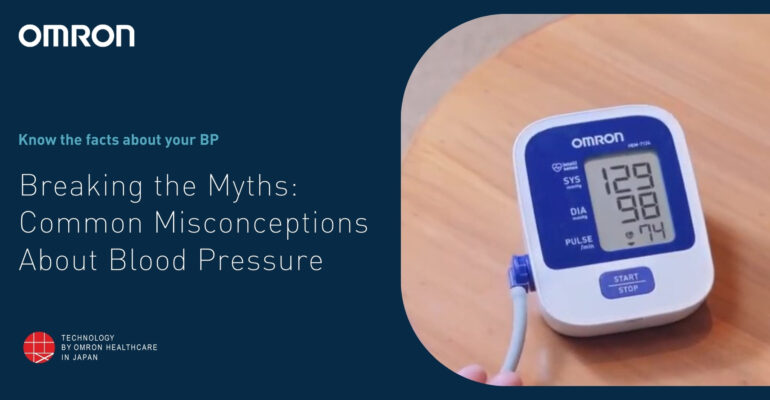Breaking the Myths: Common Misconceptions About Blood Pressure
December 12, 2023 2024-06-26 15:31Breaking the Myths: Common Misconceptions About Blood Pressure

Breaking the Myths: Common Misconceptions About Blood Pressure
Blood pressure is a critical measure of our cardiovascular health, yet there are numerous misconceptions surrounding it that can lead to confusion and misinformation. Maintaining a healthy lifestyle and avoiding potential consequences require knowing the facts about blood pressure. In this blog, we will debunk common myths surrounding blood pressure, providing clarity on this vital aspect of our well-being.
Myth 1: Only Older Adults Need to Worry About Blood Pressure
One prevalent misconception is that high blood pressure only affects the elderly. The reality is that people of all ages can develop hypertension. Lifestyle factors, genetics, and other health conditions can contribute to elevated blood pressure, even in young adults and children. Regular monitoring and healthy habits are crucial for everyone, regardless of age.
Myth 2: High Blood Pressure Always Comes with Noticeable Symptoms
Contrary to popular belief, high blood pressure often presents no noticeable symptoms. This silent nature makes it even more dangerous, as individuals may not be aware of the condition until it leads to severe complications such as heart disease, stroke, or kidney damage. Regular check-ups and monitoring are key to detecting and managing hypertension.
Myth 3: Lowering Salt Intake Alone Will Solve the Problem
While excessive salt intake can contribute to high blood pressure, it’s only one piece of the puzzle. Other factors, such as genetics, obesity, lack of physical activity, and excessive alcohol consumption, also play significant roles. Adopting a holistic approach that includes a balanced diet, regular exercise, and stress management is essential for maintaining healthy blood pressure levels.
Myth 4: If You Feel Stressed, Your Blood Pressure Will Rise Permanently
Stress can temporarily elevate blood pressure, but it doesn’t necessarily lead to a chronic increase. The body’s stress response is a natural and temporary reaction, and blood pressure usually returns to normal once the stressor is removed. However, chronic stress can contribute to long-term hypertension, emphasizing the importance of stress management in overall cardiovascular health.
Myth 5: Only High Blood Pressure is a Concern
While high blood pressure is a significant health concern, low blood pressure can also pose risks. Extremely low blood pressure can result in dizziness, fainting, and organ damage due to inadequate blood flow. It’s crucial to maintain a balance and consult with a healthcare professional to determine the appropriate blood pressure range for individual health.
Myth 6: Medication Is the Only Solution for High Blood Pressure
While medication can be necessary for managing high blood pressure, lifestyle changes are equally important. Adopting a healthy diet, engaging in regular physical activity, maintaining a healthy weight, and managing stress can significantly contribute to blood pressure management. In some cases, lifestyle modifications alone can lead to improvements without the need for medication.
Myth 7: Once You Start Medication, You Can Stop Monitoring Your Blood Pressure
Taking Hypertension medications does not excuse you from regularly monitoring your blood pressure. Regular checks are required to ensure your blood pressure medication works well and detect any negative effects. Additionally, lifestyle changes can still play a vital role in conjunction with medication.
Myth 8: Home Blood Pressure Monitors Are Inaccurate
Advancements in technology have significantly improved the accuracy of home blood pressure monitors. Omron, a reputable brand in the field of healthcare technology, offers reliable and clinically validated blood pressure monitors for home use. These devices provide individuals with a convenient and accurate way to monitor their blood pressure regularly, helping in early detection and management of any deviations from the normal range.
Conclusion:
Dispelling these prevalent misunderstandings is critical for spreading accurate blood pressure information and encouraging people to make proactive efforts to protect their cardiovascular health. Regular monitoring, a balanced lifestyle, and timely medical intervention when necessary are the key components of effective blood pressure management. Remember, knowledge is power, and understanding the facts about blood pressure empowers individuals to make informed decisions for a heart-healthy life.






